

Index of /ctan/info/lshort. Online tutorials for LaTeX. The TeX showcase. This is the TeX showcase, edited by Gerben Wierda.
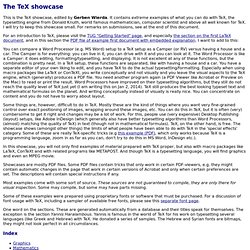
It contains extreme examples of what you can do with TeX, the typesetting engine from Donald Knuth, world famous mathematician, computer scientist and above all well known for TeX. I will try to keep this showcase small. For remarks on submissions, see at the end of this document. For an introduction to TeX, please visit the TUG "Getting Started" page, and especially the section on the first LaTeX document, and in this section the PDF file of example first document with embedded explanation. I want to add to this: You can compare a Word Processor (e.g. Some things are, however, difficult to do in TeX. In this showcase, you will not only find examples of material prepared with TeX proper, but also with macro packages like LaTeX, ConTeXt and with related programs like METAPOST.
Showcases are mostly PDF files. Most examples come with some sort of source. One word on the sections. Index Graphics Mathematics. GISS: Hypertext Help with LaTeX. LaTeX is a word processing (or, more accurately, a typesetting) program.
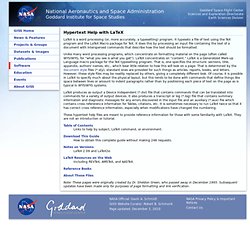
It typesets a file of text using the TeX program and the LaTeX Macro package for TeX. It does this by processing an input file containing the text of a document with interspersed commands that describe how the text should be formatted. Unike many word processing programs, which concentrate on formatting material on the page (often called WYSIWYG, for "what you see is what you get"), LaTeX concentrates on "content. " LaTeX is a Generalized Mark-up Language macro package for the TeX typesetting program.
Psycholinguistics. Psycholinguistics or psychology of language is the study of the psychological and neurobiological factors that enable humans to acquire, use, comprehend and produce language. [1] Initial forays into psycholinguistics were largely philosophical ventures, due mainly to a lack of cohesive data on how the human brain functioned.
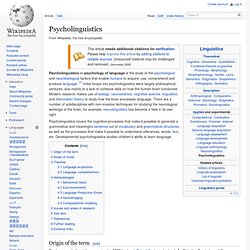
Modern research makes use of biology, neuroscience, cognitive science, linguistics, and information theory to study how the brain processes language. There are a number of subdisciplines with non-invasive techniques for studying the neurological workings of the brain; for example, neurolinguistics has become a field in its own right. Origin of the term[edit] AI-complete. In the field of artificial intelligence, the most difficult problems are informally known as AI-complete or AI-hard, implying that the difficulty of these computational problems is equivalent to that of solving the central artificial intelligence problem—making computers as intelligent as people, or strong AI.[1] To call a problem AI-complete reflects an attitude that it would not be solved by a simple specific algorithm.
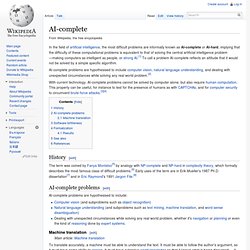
AI-complete problems are hypothesised to include computer vision, natural language understanding, and dealing with unexpected circumstances while solving any real world problem.[2] Computer science. Computer Science (abbreviated CS or CompSci) is the scientific and practical approach to computation and its applications.
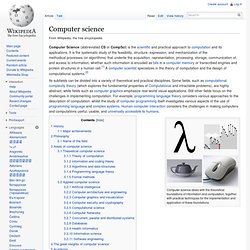
It is the systematic study of the feasibility, structure, expression, and mechanization of the methodical processes (or algorithms) that underlie the acquisition, representation, processing, storage, communication of, and access to information, whether such information is encoded as bits in a computer memory or transcribed engines and protein structures in a human cell.[1] A computer scientist specializes in the theory of computation and the design of computational systems.[2] Computer science deals with the theoretical foundations of information and computation, together with practical techniques for the implementation and application of these foundations History[edit] Charles Babbage is credited with inventing the first mechanical computer. Ada Lovelace is credited with writing the first algorithm intended for processing on a computer.
Major achievements[edit] Speech recognition. Speech recognition is usually processed in middleware, the results are transmitted to the user applications.
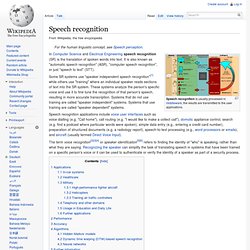
In Computer Science and Electrical Engineering speech recognition (SR) is the translation of spoken words into text. It is also known as "automatic speech recognition" (ASR), "computer speech recognition", or just "speech to text" (STT). Some SR systems use "speaker independent speech recognition"[1] while others use "training" where an individual speaker reads sections of text into the SR system. These systems analyze the person's specific voice and use it to fine tune the recognition of that person's speech, resulting in more accurate transcription. Systems that do not use training are called "speaker independent" systems. Speech recognition applications include voice user interfaces such as voice dialling (e.g. The term voice recognition[2][3][4] or speaker identification[5][6] refers to finding the identity of "who" is speaking, rather than what they are saying.
Knowledge representation and reasoning. Knowledge representation and reasoning (KR) is the field of artificial intelligence (AI) devoted to representing information about the world in a form that a computer system can utilize to solve complex tasks such as diagnosing a medical condition or having a dialog in a natural language.

Knowledge representation incorporates findings from psychology about how humans solve problems and represent knowledge in order to design formalisms that will make complex systems easier to design and build. Knowledge representation and reasoning also incorporates findings from logic to automate various kinds of reasoning, such as the application of rules or the relations of sets and subsets. Examples of knowledge representation formalisms include semantic nets, Frames, Rules, and ontologies.
Examples of automated reasoning engines include inference engines, theorem provers, and classifiers. Overview[edit] This hypothesis was not always taken as a given by researchers.
News. Google Reader (153) Science Daily: News & Articles in Science, Health, Environment & Technology. 2011-2012 XSEDE Scholars Application Form.